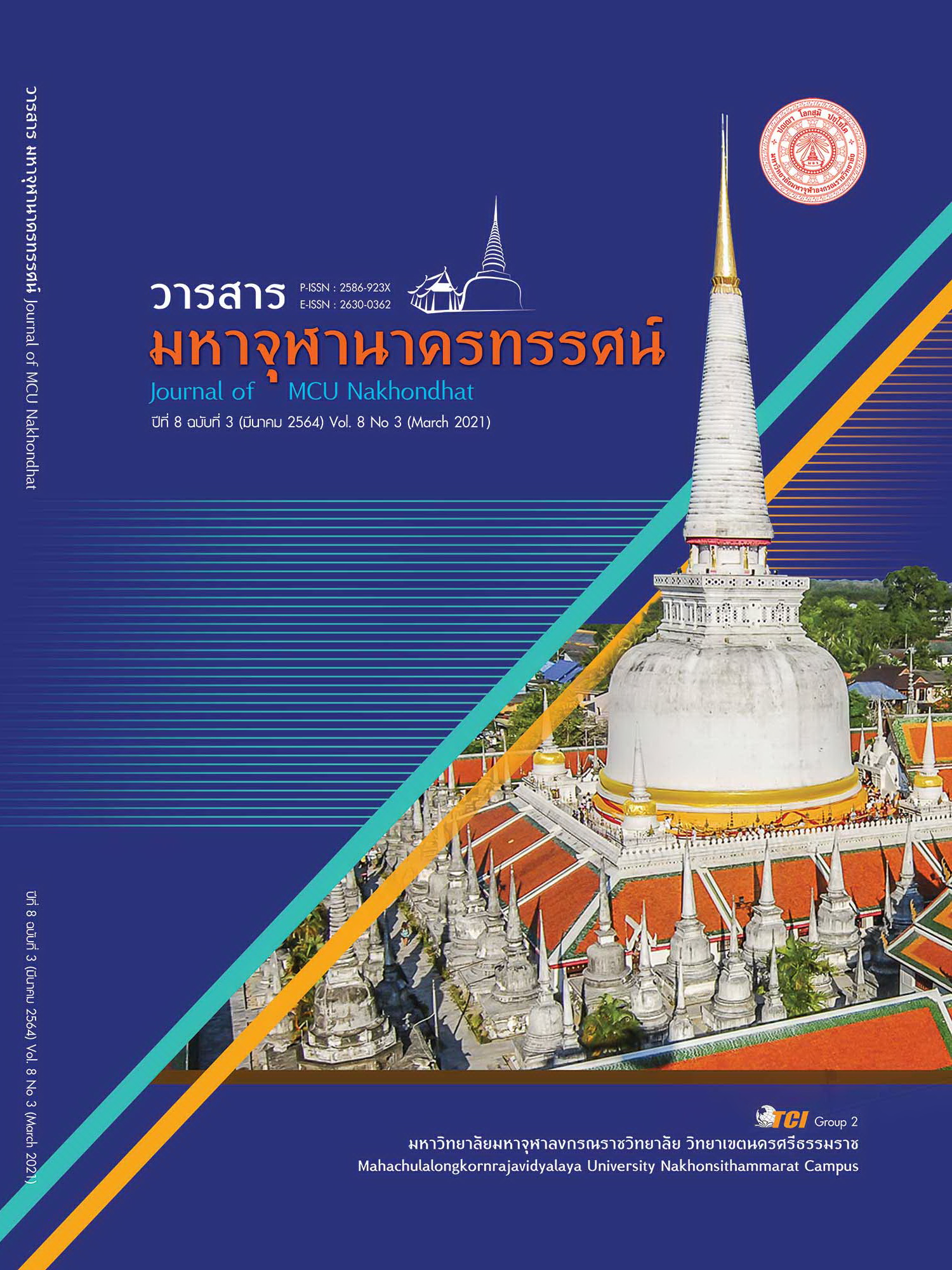ANALYZING ĀLAYAVIJÑĀNA OF YOGĀCĀRA BASE ON THE LIGHT OF MAHĀYĀNA BUDDHIST PHILOSOPHY
Main Article Content
Abstract
The objectives of this research article were to study the Ālayavijñāna of Yogācāra Buddhism, to analyze the Ālayavijñāna in Yogācāra Buddhism based on the Mahayana Buddhist philosophy, and to apply the Ālayavijñāna perspective for the daily - life. This research is qualitative research conducted by the study of relevant documents. Analysis data using a content analysis method and the gathered data were interpreted by the descriptive analysis. The results of the research revealed that the Ālayavijñāna refers to the spirits or units of consciousness that are collections of various imprint of karma or all things seeds, both wholesome and unwholesome of all - Beings in Samsara and is the foundation and connected with seven other spirits. The main function of the Ālayavijñāna is knowing accumulation, knowing creation, and knowing the mental formation. Analysis indicates that the Ālayavijñāna have pure, original nature, be the tathãgatagarbha and Buddhahood. For this reason, the Ālayavijñāna influence the samsara and liberation depending on the continuous flow of seeds from soul to soul and from spirit to the seven - soul. The Ālayavijñāna as the original mind has true, pure and luminious nature but was blemish by defect function of Manas, made up by the influence of defilements. However, if the mind accumulates good karma, get a lot of wholesome - seed then the Ālayavijñāna was indeed pure. Therefore, the Ālayavijñāna are qualified to daily - life that make the mind loosen their adherence to the ego And feel unattachment sense because the Ālayavijñāna is the center of the link between world and liberation. When a person ends up holding on to the ego, as a result common people can eliminate division and duality and ultimately bring society to peace.
Article Details
References
พระมหาพุทธรักษ์ ปราบนอก. (2547). การศึกษาวิเคราะห์คัมภีร์มหายานสูตราลังการ. ใน ดุษฎีนิพนธ์ศิลปศาสตรดุษฎีบัณฑิต สาขาวิชาภาษาสันสกฤต ภาควิชาภาษาตะวันออก. บัณฑิตวิทยาลัยมหาวิทยาลัยศิลปากร.
พระมหาสมบูรณ์ วุฑฺฒิกโร (พรรณนา). (2552). จิตตมาตรของนิกายโยคาจาร: การศึกษาเชิงวิเคราะห์บนฐานแนวคิดเรื่องจิตในพระพุทธศาสนายุคต้น. ใน ดุษฎีนิพนธ์พุทธศาสตรดุษฎีบัณฑิต สาขาพุทธศาสนา. มหาวิทยาลัยมหาจุฬาลงกรณราชวิทยาลัย.
สมภาร พรมทา. (2534). พุทธศาสนามหายาน. กรุงเทพมหานคร: มหาจุฬาลงกรณราชวิทยาลัย.
สุมาลี มหณรงค์ชัย. (2541). อาลยวิชญานในพุทธปรัชญานิกายโยคาจาร. ใน วิทยานิพนธ์อักษรศาสตรมหาบัณฑิต สาขาวิชาปรัชญา. จุฬาลงกรณ์มหาวิทยาลัย.
สุมาลี มหณรงค์ชัย. (2550). พุทธศาสนามหายาน. (พิมพ์ครั้งที่ 2) กรุงเทพมหานคร: สำนักพิมพ์ศยาม.
อรรณี ฉัตรโชติธรรม. (2555). การศึกษาเปรียบเทียบแนวคิดเรื่องจิตประภัสสรในพุทธปรัชญาเถรวาทกับแนวคิดจิตเดิมแท้ของนิกายเซน. ใน วิทยานิพนธ์พุทธศาสตรมหาบัณฑิต สาขาวิชาปรัชญา. บัณฑิตวิทยาลัย มหาวิทยาลัยมหาจุฬาลงกรณราชวิทยาลัย.
Chatterjee, A. K. (1987). The Yogacara Idealism. Delhi: Motilal Banarsidass.
Suzuki, D. T. (1972). The Lankavatara Sutra. London and Boston: Routledge & Kegan Paul Ltd.
Thomas, E. W. (1994). Mind Only: A Philosophical and Doctrinal Analysis of the Vijnanava. Delhi: Shri Jainendra Press, IX.


